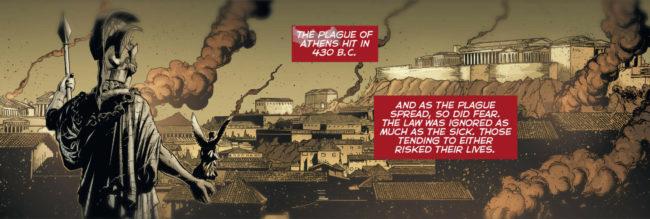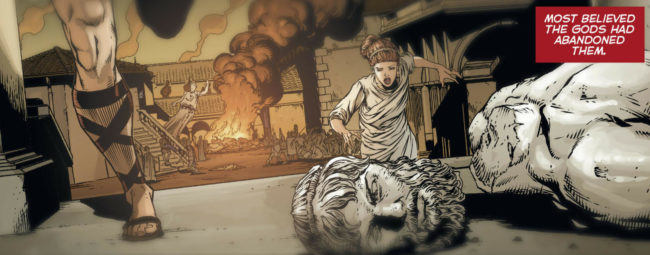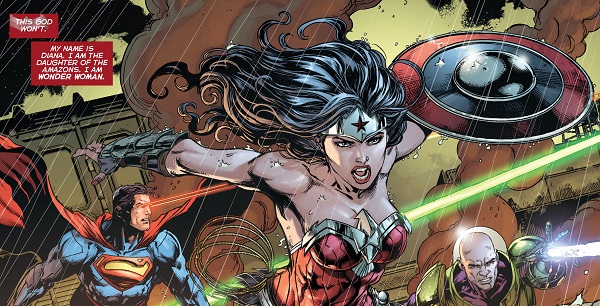
In 2015, the Justice League found themselves unable to combat the deadly Amazo Virus. It affected humans and metahumans in fantastical and horrific ways, ultimately killing its victims. Superman and Wonder Woman were among the immune, being an alien and a god respectfully, and thus, they were on the front lines of trying to unravel a cure.
At the peak of their desperation, Wonder Woman evoked a similar situation from Ancient Greece. In Justice League 39 (2015), the Amazonian tells us
The Plague of Athens hit in 430 B.C.
And as the plague spread, so did fear. The Law was ignored as much as the sick. Those tending to either risked their lives.
Beyond the contagion and the disease, the outbreak poisoned minds and hearts.
In the heat of death, panic and depravity ruled Athens.
Compassion and decency collapsed.
Most believed the gods had abandoned them.
That was true.
The gods had.
Wonder Woman succinctly describes one of the most infamous plagues in history. At the beginning of a 3-decade-long war between Athens and Sparta that became known as the Peloponnesian War (431-404 BC), the plague struck and brought Athens to its knees.

Today, we benefit from superb detail provided by Thucydides, an eyewitness to the war and a survivor of the plague.
While Sparta was doing damage to the countryside outside of Athens’ walls, Thucydides informs us that “nothing afflicted and damaged Athenian strength more than” the plague (3.87.2), as it “inflicted a very great amount of suffering on the Athenians, destroying the army” (2.58) and killed “an untold number of the general population” (3.87.3). Modern historians estimate that the plague killed 1/3rd of the city’s population, as it ebbed and flowed for years. ((This is the common estimate for the devastation of the Athenian population. For example, see Lawrence A. Tritle, A New History of the Peloponnesian War (Malden: Wiley-Blackwell, 2010), 48; Terry Buckley, Aspects of Greek History: A Source-Based Approach, 2nd ed. (New York: Routledge, 2010), 342.))
Wonder Woman tells us that “Most believed the gods had abandoned them. That was true.” There are tales of Greeks envisioning plagues and natural disasters as instruments of the gods. The Iliad opens with Apollo firing arrows at the Spartans, inflicting them with a plague (1.74-83).
In Athens, Thucydides is clear that initially doctors were clueless and appeasements to the gods had no affect (2.47). He also points to how a Delphic prophesy was misinterpreted to show that the gods favored Sparta over Athens, which people seemed to believe since Sparta was relatively spared from the plague (1.118.3, 2.54.4). However, Thucydides was more rational in his thinking, brushing aside fantastical origins of the plague and instead tracing it from Ethiopia, then Egypt, Libya, and finally the Persian Empire before reaching Greece (2.48). As for those misinterpreting the Delphic prophecy, Thucydides believed “men shaped their memories in accordance with what they experienced” (2.54).
Wonder Woman also tells us “the outbreak poisoned minds and hearts. In the heat of death, panic and depravity ruled Athens. Compassion and decency collapsed.” Thucydides provides more detail in one of his more brutal passages:
The plague was the starting point for greater lawlessness in the city. Everyone was ready to be bolder about activities they had previously enjoyed only in secret…whatever was pleasant immediately and whatever was conducive to that were deemed both noble and useful. Neither fear of the gods nor law of man was a deterrent, since it was judged all the same whether they were pious or not because of seeing everyone dying with no difference, and since no one anticipated that he would live till trial and pay the penalty for his crimes, but that the much greater penalty which had already been pronounced was hanging over them, and it was reasonable to get some satisfaction from life before that descended (2.53).
At the point in the story where Wonder Woman evokes the Plague of Athens, the Justice League are also facing terrible odds with hospitals full of dead and dying and the streets filled with lawlessness. Thucydides also described dead and dying lying on top of each other while sanctuaries were filled with the dead. Bodies were burned or tossed into mass graves (2.52). As for the survivors, “their minds reduced to despair on every count” (2.59).
Wonder Woman blurs the lines of fictitious and historical desperation eerily. If this is too bleak for readers who may cringe at the thought of gods abandoning inflicted people, the Amazonian concludes her monologue with “This god won’t. My name is Diana. I am the daughter of the Amazons. I am Wonder Woman.”

